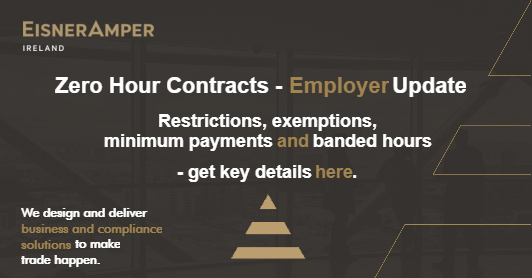

A Zero Hour contract is an employment contract that does not guarantee an employee a minimum number of working hours, whilst still requiring the employee to be available for work either for a certain number of hours or when required by the employer (or both).
Under a Zero Hour contract there is an obligation on the employer to offer work to the employee and an obligation on the employee to accept the offer of work. If the employee is not offered hours during the time when they are expected to be available, the employer must compensate the employee.
Alternatively, if an employee and an employer agree a contract that does not oblige either party to provide work or be available for work, this is known as an If and When contract. As there is no mutuality of obligation, anyone working under an If and When contract could be considered a contractor rather than an employee.
Under legislation that came into effect on 4 March 2019, the use of Zero Hour contracts is now restricted in most circumstances. Employers must now inform their staff of the number of hours they would be reasonably expected to work in a normal working day and a normal working week.
Zero Hour contracts can still be used in the following situations:
Employers are now obliged to provide workers with a written statement of the five core terms of their employment within five days of starting work. The terms are:

Key elements of the updated legislation relate to minimum payments. For example, if an employee is not called into work, they are entitled to be paid for 25% of the hours they would have reasonably been expected to work, at a rate of 3 times the national minimum wage. Therefore, an employee whose contract requires them to be available for 20 hours per week should be paid for a minimum of five hours in the event of not being offered work in any given week.
Where an employee’s actual number of working hours over a 12 month period is in excess of the hours stated in their contract they can request to be given a Banded Hours contract. A Banded Hours contract guarantees an employee an average number of hours of work within one of the following bands:
| Bands of weekly working hours | From | To |
| Band A | 3 hours | 6 hours |
| Band B | 6 hours | 11 hours |
| Band C | 11 hours | 16 hours |
| Band D | 16 hours | 21 hours |
| Band E | 21 hours | 26 hours |
| Band F | 26 hours | 31 hours |
| Band G | 31 hours | 36 hours |
| Band H | 36 hours and over |
Source: irishstatutebook.ie.
Payroll administrators in Ireland operate in a heavily regulated space with legislative changes continually coming down the line which add new administrative requirements to existing work practices.
At EisnerAmper Ireland, our dedicated outsourced payroll professionals possess the knowledge and experience required to ensure you are fully compliant with current and future legislation, without impacting on the day to day running of your business.
Learn more about our Outsourced Payroll Services here.
Request a payroll quote or request a callback from our specialists now.
 +353 1 293 3400
+353 1 293 3400

 +1 212 949 8700
+1 212 949 8700
 +1 345 945 5889
+1 345 945 5889
 +65 6305 9900
+65 6305 9900